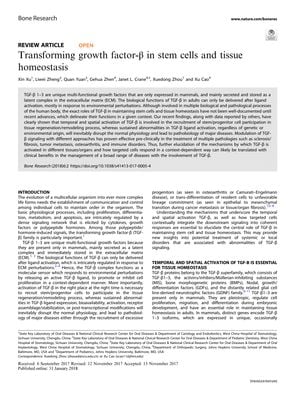Transforming Growth Factor-Beta in Stem Cells and Tissue Homeostasis
January 2018
in “
Bone Research
”

TLDR TGF-β is crucial for tissue repair and can cause diseases if not properly regulated.
The document from 2018 reviews the role of Transforming Growth Factor-Beta (TGF-β) in stem cells and tissue homeostasis, emphasizing its importance in tissue regeneration and remodeling, as well as its involvement in diseases when abnormally activated. TGF-β is secreted in a latent form and requires activation by environmental cues. Abnormalities in TGF-β signaling can lead to conditions like sclerosis, fibrosis, tumor metastasis, osteoarthritis, and immune disorders. The review discusses TGF-β activation by thrombospondin-1 (TSP-1), integrins, osteoclasts, and reactive oxygen species (ROS), and its signaling through Smad proteins and other pathways. It also covers TGF-β's role in stem cell migration, particularly mesenchymal stem cells (MSCs), and its influence on embryonic stem cells (ESCs), adult stem cells, and hair follicle stem cells (HFSCs). The document further explores TGF-β's evolutionary significance in vertebrates, its impact on osteoarthritis, genetic bone disorders, organ fibrosis, cancer metastasis, and bone metastases, particularly in breast cancer. It concludes that understanding TGF-β's interactions is crucial for regenerative medicine and managing diseases involving TGF-β signaling.







